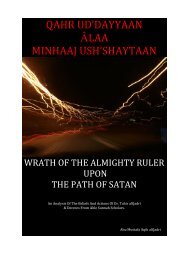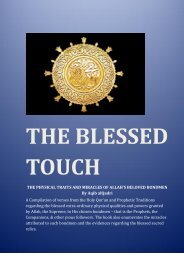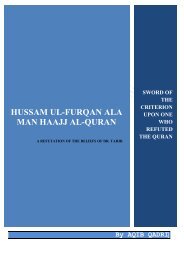The Book Of Prayer (Kitaab-ul-Salaat)
The Book Of Prayer (Kitaab-ul-Salaat)
The Book Of Prayer (Kitaab-ul-Salaat)
You also want an ePaper? Increase the reach of your titles
YUMPU automatically turns print PDFs into web optimized ePapers that Google loves.
<strong>The</strong> <strong>Prayer</strong>s <strong>Of</strong> <strong>The</strong> Pious<br />
Every <strong>Prayer</strong> sho<strong>ul</strong>d be offered like a person who is certain that it is the last <strong>Prayer</strong> of his life.<br />
Hazrat Hatim Balkhi (may Allah have mercy upon him) was once questioned as to how he<br />
offered his <strong>Prayer</strong>s. He answered, "When it is time for <strong>Prayer</strong>, I do a proper ablution and stand<br />
calmly on the prayer-mat. I imagine that the Holy Kaaba is in front of me, Paradise on my right,<br />
hell on my left, and that I am standing on the thin bridge (of the Day of Resurrection) - and that<br />
the angel of death is above me and that this is the last <strong>Prayer</strong> of my life. <strong>The</strong>n with utmost<br />
humility I proclaim "Allahu Akbar (Allah is the Greatest)" and keeping the meanings in mind, I<br />
recite the Holy Qur'an - and with extreme reverence and humility I complete the <strong>Prayer</strong>s. I then<br />
hope that Allah will accept it by His mercy, and fear that it may be rejected because of the<br />
shortcomings of my deeds."<br />
Such is the <strong>Prayer</strong> of the Friends of Allah! May Allah guide us to follow the footsteps of His<br />
friends. Aameen.<br />
CLEANLINESS (TAHARAT)<br />
CHAPTER 2<br />
<strong>The</strong> Holy Prophet (peace and blessings be upon him) has stated "<strong>The</strong> key to paradise is <strong>Prayer</strong><br />
(<strong>Salaat</strong>), and the key to <strong>Prayer</strong> is cleanliness." (Saheeh Muslim). Here cleanliness means that the<br />
place of <strong>Prayer</strong> and the person’ s clothes, sho<strong>ul</strong>d be clean. Furthermore, the person sho<strong>ul</strong>d be<br />
clean from the greater and smaller impurities - i.e. he sho<strong>ul</strong>d not be in need of a bath (Ghusl) and<br />
sho<strong>ul</strong>d be with ablution (Wuzu).<br />
<strong>The</strong> Holy Prophet (peace and blessings be upon him) said: “ <strong>The</strong> angels of mercy do not enter a<br />
house in which there is an image, a dog or a person in a state of greater impurity (Janabah)."<br />
(Abu Dawood).<br />
<strong>The</strong> Water To Be Used<br />
Water used for bathing or for ablution must be in its natural state - i.e. free from colour, smell<br />
and taste. Furthermore, it must be unused. If the body is free from impurities, the water once<br />
used for bathing or ablution still remains pure, but cannot be used again for bathing or ablution.<br />
Similarly if one is in need of ablution or bath, and he dips or touches the water with any<br />
unwashed (un-purified) part of his body (finger, nail, hand etc), it will render the water as used -<br />
and therefore not usef<strong>ul</strong> for ablution or bathing. Using such water for drinking or cooking is<br />
disliked (Makrooh). However this water can be used for washing clothes.<br />
In order to make "used" water capable of being used for bathing or ablution, add clean unused<br />
water in greater quantity to it - or simply pour more clean unused water in the utensil so that the<br />
utensil begins to overflow. This will make the entire water usable for bathing or ablution.





